#cognitive bias
Explore tagged Tumblr posts
Text
There are few things which illustrate the curse of knowledge more starkly than some twerp on Tumblr going "well ACTUALLY [media that's popularly regarded as difficult to explain] is easy to explain, you're all just pretending it's hard for clout – watch this", then proceeding to set forth the shittiest explanation of a piece of media you've ever seen.
2K notes
·
View notes
Text

304 notes
·
View notes
Text
Writing Notes: Cognitive Bias

Cognitive Bias - a strong, preconceived notion of someone or something, based on information we have, perceive to have, or lack.
These preconceptions are mental shortcuts the human brain produces to expedite information processing—to quickly help it make sense of what it is seeing.
The many types of cognitive biases serve as systematic errors in a person’s subjective way of thinking, which originate from that individual’s own perceptions, observations, or points of view.
There are different types of bias people experience that influence and affect the way we think and behave, as well as our decision-making process.
Examples of Cognitive Bias
Confirmation bias. This type of bias refers to the tendency to seek out information that supports something you already believe, and is a particularly pernicious subset of cognitive bias—you remember the hits and forget the misses, which is a flaw in human reasoning. People will cue into things that matter to them, and dismiss the things that don’t, often leading to the “ostrich effect,” where a subject buries their head in the sand to avoid information that may disprove their original point.
The Dunning-Kruger Effect. This particular bias refers to how people perceive a concept or event to be simplistic just because their knowledge about it may be simple or lacking—the less you know about something, the less complicated it may appear. However, this form of bias limits curiosity—people don’t feel the need to further explore a concept, because it seems simplistic to them. This bias can also lead people to think they are smarter than they actually are, because they have reduced a complex idea to a simplistic understanding.
In-group bias. This type of bias refers to how people are more likely to support or believe someone within their own social group than an outsider. This bias tends to remove objectivity from any sort of selection or hiring process, as we tend to favor those we personally know and want to help.
Self-serving bias. A self-serving bias is an assumption that good things happen to us when we’ve done all the right things, but bad things happen to us because of circumstances outside our control or things other people purport. This bias results in a tendency to blame outside circumstances for bad situations rather than taking personal responsibility.
Availability bias. Also known as the availability heuristic, this bias refers to the tendency to use the information we can quickly recall when evaluating a topic or idea—even if this information is not the best representation of the topic or idea. Using this mental shortcut, we deem the information we can most easily recall as valid, and ignore alternative solutions or opinions.
Fundamental attribution error. This bias refers to the tendency to attribute someone’s particular behaviors to existing, unfounded stereotypes while attributing our own similar behavior to external factors. For instance, when someone on your team is late to an important meeting, you may assume that they are lazy or lacking motivation without considering internal and external factors like an illness or traffic accident that led to the tardiness. However, when you are running late because of a flat tire, you expect others to attribute the error to the external factor (flat tire) rather than your personal behavior.
Hindsight bias. Hindsight bias, also known as the knew-it-all-along effect, is when people perceive events to be more predictable after they happen. With this bias, people overestimate their ability to predict an outcome beforehand, even though the information they had at the time would not have led them to the correct outcome. This type of bias happens often in sports and world affairs. Hindsight bias can lead to overconfidence in one’s ability to predict future outcomes.
Anchoring bias. The anchoring bias, also known as focalism or the anchoring effect, pertains to those who rely too heavily on the first piece of information they receive—an “anchoring” fact— and base all subsequent judgments or opinions on this fact.
Optimism bias. This bias refers to how we as humans are more likely to estimate a positive outcome if we are in a good mood.
Pessimism bias. This bias refers to how we as humans are more likely to estimate a negative outcome if we are in a bad mood.
The halo effect. This bias refers to the tendency to allow our impression of a person, company, or business in one domain influence our overall impression of the person or entity. For instance, a consumer who enjoys the performance of a microwave that they bought from a specific brand is more likely to buy other products from that brand because of their positive experience with the microwave.
Status quo bias. The status quo bias refers to the preference to keep things in their current state, while regarding any type of change as a loss. This bias results in the difficulty to process or accept change.
How to Reduce Cognitive Bias
Even though cognitive biases are pervasive throughout every system, there are ways to address your bias blind spots:
Be aware. The best way to prevent cognitive bias from influencing the way you think or make decisions is by being aware that they exist in the first place. Critical thinking is the enemy of bias. By knowing there are factors that can alter the way we see, experience, or recall things, we know that there are additional steps we must take when forming a judgment or opinion about something.
Challenge your own beliefs. Once you’re aware that your own thinking is heavily biased, continuously challenge the things you believe is a good way to begin the debiasing process—especially when receiving new information. This can help you expand your pool of knowledge, giving you a greater understanding of the subject matter.
Try a blind approach. Especially in the case of observer bias, researchers conduct blind studies to reduce the amount of bias in scientific studies or focus groups. By limiting the amount of influential information a person or group of people receive, they can make less affected decisions.
Biases make it difficult for people to exchange accurate information or derive truths.
A cognitive bias distorts our critical thinking, leading to possibly perpetuating misconceptions or misinformation that can be damaging to others.
Biases lead us to avoid information that may be unwelcome or uncomfortable, rather than investigating the information that could lead us to a more accurate outcome.
Biases can also cause us to see patterns or connections between ideas that aren’t necessarily there.
Logical Fallacy vs. Cognitive Bias
Cognitive biases are often confused with logical fallacies.
A cognitive bias refers to how our internal thinking patterns affect how we understand and process information.
A logical fallacy refers to an error in reasoning that weakens or invalidates an argument.
Cognitive biases are systematic errors in a person’s subjective way of thinking, while logical fallacies are about the errors in a logical argument.
Source ⚜ More: Notes & References ⚜ Writing Resources PDFs
#cognitive bias#writing notes#writing tips#writeblr#literature#writers on tumblr#writing reference#dark academia#spilled ink#writing prompt#creative writing#writing advice#on writing#writing inspiration#writing ideas#light academia#lit#writing resources
109 notes
·
View notes
Text
I’m gonna start coining tumblr specific cognitive biases and logical fallacy terms…here’s the first ones I’ve theorized so far. (I’m using “actor” here meaning “the person, acting out the fallacy or bias for us all to see.”)
1. The unique contribution fallacy—reading a post of over 10k notes and the actor thinks of something they surmise is very clever to add. The actor imagines themselves to be the first special unique soul to contribute this add, when OP has actually received this “clever” comment 5000 times of those 10,000 notes driving OP up the wall.
2. The whataboutism bias— reading a post on any given particular topic, and believing that OP should say every single thing that you could possibly say about that topic under said single post. The actor doesn’t know they have a personal agenda on the topic and expects OP would have that same bias to talk about the side of the given topic that correlates to the actor’s personal bias, instead of allowing OP to be somebody who just writes what they wanted to write. This often works in tandem with… 
3. The TLDR bias— seeing a post that is actually extremely long and thoroughly well written, often times with sources, numerous added threads of detail etc. but the actor doesn’t actually read the content of the FULL post. Then, in reblogging it or commenting on it, “adding” something that OP definitely originally said, and revealing oneself as somebody who doesn’t even read the detailed things that they re-blog or add on comments about.
3. The literal URL fallacy— not understanding the total chaos that is the Tumblr URL, in this fallacy the actor thinks that someone’s username is ALWAYS telling you exactly what the content of their blog might be. I’ll illustrate this one in like a totally random example way… Let’s say that you hypothetically made a blog that was all about calling out bigots back in the days of yore, the early twenty teens. And yet somehow, despite the fact that every other user around you seems to not be taken literally by their URLs, the actor decides that everything that you post is therefore bigotry…….even if what you’re posting is your own original content that you’re writing, calling out bigots. Too bad, so sad! Because in this fallacy, the actor is going to see you as what your URL says, literally, always.
4. The missed URL fallacy— this of course is the exact opposite of number three. It is where a blog has a very particular theme and format to it, that is the most important thing you can notice to understand the context of a post. So, again, just a random example here… But let’s just say that the intent of a blog is to always post submitted weird ass dreams people had, but the actor doesn’t realize this in their relogging and thinks that somebody is reporting a real life situation that was definitely, very specifically a wild fever dream.
5. The throw the baby out with the bathwater bias— a fan favorite among left leaning and social justice corners of the site, this bias is when the actor reads a post where somebody doesn’t use the most optimal, virtue signaling language for them personally, so the actor ignores the whole entire point of the post. It could be something as serious as and attention demanding as genocide, but somebody uses a word like “crazy” or “stupid” or “bitch” in it and so the actor’s worldview and general proclaimed values are casually tossed aside because the language that was used to deliver it was not “perfect.”
6. The choose your own reality bias—The actor reads a post and reblogs it, adding commentary that is responding to things that are definitely not said in the original post and definitely not anything in the realm of what OP was talking about. Close cousin to…
7. The this is definitely about me/self-own fallacy— this one is actually one of my favorites to spot out in the wild because it is SUCH a tell. It is like a slightly more specific version of the “choose your own reality bias” but this is when the actor reads a post and blogs it, adding commentary that is responding to things that are definitely not said in the original post as if OP is talking about them personally, and therefore revealing themselves as potentially shady or suspect in someway because why did they make it about them, if it’s not about them, you know?
8. The zombie post fallacy—in this one, the actor most likely does not have time stamps enabled on their dash because that isn’t something that happens here by default, and this site has a higher presence of zombie posts (by the way its designed and how it functions) than any other social media site I know. So when a zombie post from 2011 shambles across their dash in 2024, they react to that content as if it is completely new and relevant information or news or a situation to be dealt with in the modern era.
What needs added?
376 notes
·
View notes
Text
Reposting via a redditor; re:
Is there a sound argument for why people aren’t taking this seriously?
Why do they think that way? https://essaysyoudidntwanttoread.home.blog/2022/10/09/why-do-they-think-that/? 7 psychological defense mechanisms used to downplay covid https://threadreaderapp.com/thread/1737582325779624059.html? How to hide a pandemic https://howtohideapandemic.substack.com/p/how-to-hide-a-pandemic Cognitive Dissonance & Ableism https://www.tiktok.com/@fka.monstersincooperated/video/7360285749574421802 Anti-social punishment https://www.tiktok.com/@creative.neurospice/video/7269910082769653038 NYT: Why People Fail to Notice Horrors Around Them (helplessness & habituation) https://archive.is/wVL85 [article about the ongoing right to avoid infection. ... how people just can't really face reality due to death anxiety] https://www.psychologytoday.com/us/blog/side-effects/202309/how-to-socialize-during-a-pandemic Increased risk-taking behavior during the COVID-19 pandemic: psychological underpinnings and implications https://www.scielo.br/j/rbp/a/TPpQKTwfqTH5Q8qKghRkWpf/?format=pdf&lang=en Cognitive Biases https://www.instagram.com/p/C8TdduJMtKH/ We’ve Hit Peak Denial. Here’s Why We Can’t Turn Away From Reality https://www.scientificamerican.com/article/weve-hit-peak-denial-heres-why-we-cant-turn-away-from-reality/ Difficulties in Understanding Population Risk versus Individual Risk https://www.youtube.com/watch?v=_2X_HRfJpio&list=LLkcwJR5kj80dAQNAT83d1NQ&t=2522s
See also:
Normalcy bias
Semmelweis reflex
Just-world fallacy
Survivorship bias
Compassion fatigue
Sunk cost fallacy
Learned helplessness
Informational social influence
Ableism
Nihilism
#covid#long covid#reading#reading list#info#cognitive dissonance#cognitive bias#psychology#logical fallacies#just world fallacy#informational social influence#sunk cost fallacy#ableism#learned helplessness#compassion fatigue#survivorship bias#semmelweis reflex#normalcy bias
232 notes
·
View notes
Text
Why are they not protesting about Sunnis and Shia killing each other in Yemen? 377,000 dead so far.

#spilled thoughts#news update#news#current events#current affairs#war news#genocide#student protests#campus protests#university protests#anti israel propaganda#internalized antisemitism#yemen#tel aviv#jerusalem#hostage#bring them home now#never again#terrorist supporters#terrorism supporting marches#israel hamas war#humanity#emotional intelligence#indoctrination#cognitive bias#cognitive dissonance#uk universities#uk#fake activism
61 notes
·
View notes
Text
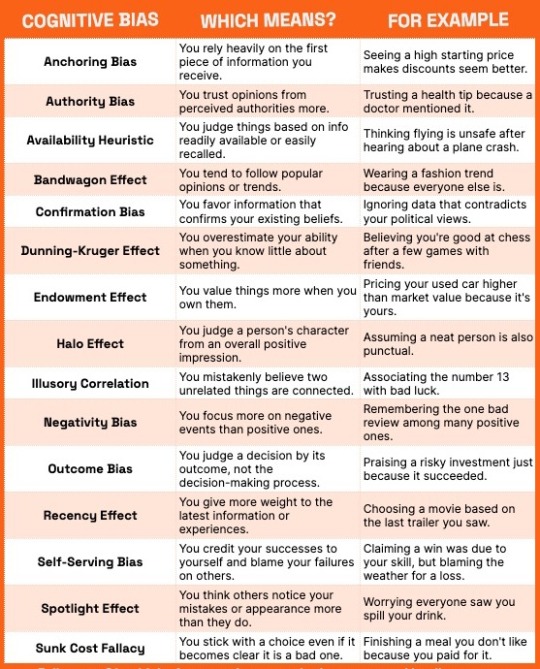
A list of cognitive biases
#cognitive bias#cool guides#pattern#judgement#rationality#psychology#bad decisions#decisions#rational choice#confirmation bias#cognition#jury trial#superiority#halo effect#outcome bias#correlation#dunning kruger#social influence#Unconscious mind
58 notes
·
View notes
Note
Hello! What do you think about how the society in OPM accepts that King is the most powerful being in the world? While Saitama is hinted at what may become a danger to society if his strength were to become known? Considering that King has (accidentally and through his own fault) stolen Saitama's merits?
Sorry this one took a bit to answer, I had other business to attend to. This one is another long piece, but I dropped a tl;dr at the end lol.
Honestly though? I think it's perceptional bias.
Perception bias is a broad term used to describe different situations in which we perceive inaccuracies in our environment. It is a type of cognitive bias that occurs when we subconsciously form assumptions or draw conclusions based on our beliefs, expectations, or emotions.
There are several subtypes: Implicit bias: individuals hold attitudes towards people, or associate stereotypes with them, without being aware of this. Fundamental attribution error: individuals tend to blame their failings on circumstances around them, but consider that others are responsible for their shortcomings. Selective perception: expectations about people or situations affect perception.
King is revered as a strong hero and so people would accept and expect him to have strong abilities. Child Emperor pictures these abilities and describes them to King. (Cpt 152, Check) King is also tall, large and mysterious man who somehow exudes a strong aura of being strong willed, capable and a just person. But the public does not know him well enough to actually see through their bias: A physically weak and anxious man who just tries to live his life in peace, but who has heart of gold, wise beyond his years and incredible sense of justice.
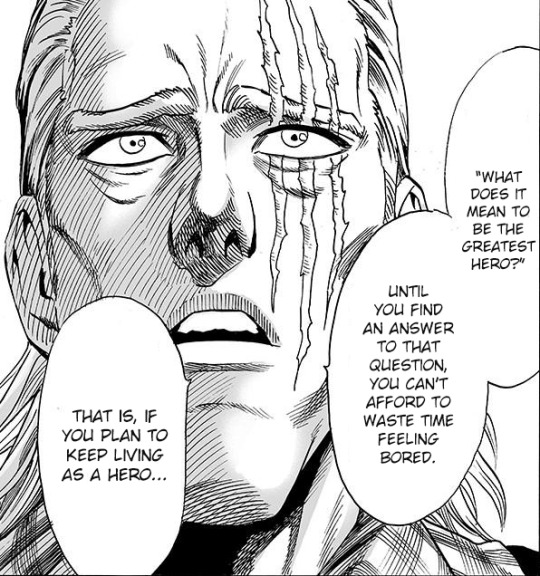
Yet despite all this, I worry for King a lot, because the cognitive bias working against him is too strong, almost unnatural. It makes little sense about why this false image is so strong, considering he nor Saitama have THAT many actually proven feats on record or even publically observed. I mean, Saitama literally destroyed a meteor and got accused for it and killed Sea King and the public turned against him...and yet none of those actual, legitimate feats are being exaggerated to this degree like Charanko describes them as in Chapter 192: Level up.
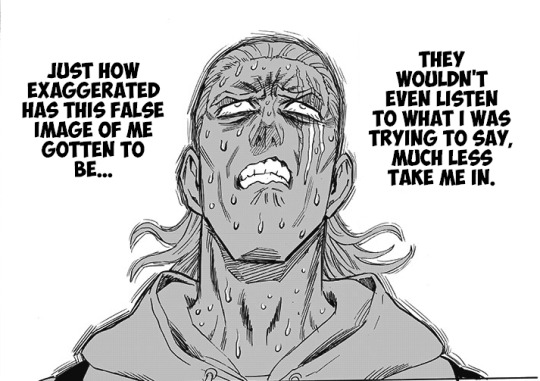
Charanko's examples are so utterly ludicrous without a single shred of actual evidence that the utter shock being told they were lies of it was enough for him to at least start shaking off that cognitive bias and question his perception and seeking out the actual truth. The guy is completely overlooked as just being a weak nobody comic relief character archetype, but he is strong willed, like when he had the guts to attack Garou in direct confrontation.
But I mean, look at this thing, this is completely absurd. Where is the entirety of OPM people's critical thinking skills?

Who in their right mind would seriously believe rumours like solar system destroying level of bomb with a bonus black hole from some rando dude on the internet? Or King not having even been born yet, somehow being the second coming of christ itself?
Plus there is only one goddamn mythology piece in this entire manga that even closely fits the bill of a human(oid) character's birth being foreshadowed and that is OPM's God's mural in a place where literally nobody has seen it before.
Who the F would even be crazy enough to imagine up and spread such a rumour that King, of all people, is actually OPM God who legit nobody even knows exists? So absurd. :D

(Above image is from volume redraw)
It's such a malicious and cruel rumour too, capable of sowing distrust and discord in the entire Hero system when people stop believing in their heroes because they think the entire system is a lie. And they would blame King for it, thinking he's to blame for the lies because he broke their idea of an hero fantasy.
The only hero I can think who actually knows about OPM God is Blast, but he's not malicious. Zero motive whatsoever.
I heavily suspect Psykos for spreading it because this kind of rumour could only come up straight from the source itself. Because she's an alarmist (Cpt 175, Visitor) and OPM God has her in his backpocket to emotionally manipulate. Fubuki might uncover some more information to discover the truth, but I'd take it with grain of salt because Psykos appears to be under some kind of mental illness, possibly psychosis, as Fubuki has pointed out that she had never been a tough girl and something changed her. But I'm no detective and I'm not void of any bias, so here's a sherlock holmes quote:
"How often have I said to you that when you have eliminated the impossible, whatever remains, however improbable, must be the truth? We know that he did not come through the door, the window, or the chimney. We also know that he could not have been concealed in the room, as there is no concealment possible. When, then, did he come?"

Honestly, the magic man in the sky is prolly doing it, we just don't know how because there's not enough evidence, only context clues.
-*-
Bang on the other hand, cannot shake off his bias even if his heart is in the right place. But he was just directly told face to face by King himself that he is weak and he still refuses to believe it because he stubborny keeps believing in his own biases, thinking he's always correct.

Old people do oftentimes think they're always correct don't they? Because they're oh so old and wise and experienced. He does the same thing with Garou and Garou won't accept it.
-*-
Anyways, I worry for King's flailing mental health for reasons because he's thinking about self-harm and he wants to unalive himself by monster hand because he thinks it's already Game over for him.

The cognitive bias around people's minds is actually and ironically, shielding him from the cascading effects of the mass public outcry since he's not ready to face it yet. He lacks willpower, that mental fortitude, to withstand that kind of attack on his psyche. He might do it if people suddenly just snapped out of that cognitive bias.
Some might even say... that he's the cognitive bias itself. King can bullshit so effectively because he's can literally project bullshit out of his every orifice if he needs to. If say, he needs to protect himself or other people. And as long as people keep their cognitive biases, it would help him sustain the image that he's strong and not be hated by everyone if they suddenly snapped out of their cognitive bias. So you could say that...the cognitive bias is helping him survive and protecting him.
A cognitive bias is a systematic pattern of deviation from norm or rationality in judgment. Individuals create their own "subjective reality" from their perception of the input. An individual's construction of reality, not the objective input, may dictate their behavior in the world. Thus, cognitive biases may sometimes lead to perceptual distortion, inaccurate judgment, illogical interpretation, and irrationality.

Look, they're instantly second guessing themselves. Seems to be working very effectively. And Atomic Samurai did some incredible mental gymnastics to convince himself that just by sitting there, King just casually cut the apple even when he saw nothing and nothing literally happened in front his very eyes. (Chapter 189, Blade test.)
At least he has Saitama at his back, because Saitama has a bullshit radar a mile wide and Saitama believes he can change to be stronger. He respects King's opinion to do what is right despite knowing he lacks real power to be that force of change himself. He does not appear at a glance to show implicit bias towards King. He originally saved the guy just because he needed saving and then did it again, despite not knowing a thing about King, aside from the assumption that he must be a strong hero, even if he was asking for information to form an opinion. And then tries to dig deeper into that and questions the logic of King running away and showing lack of bias with his objectivity. (Chapter 38, King)
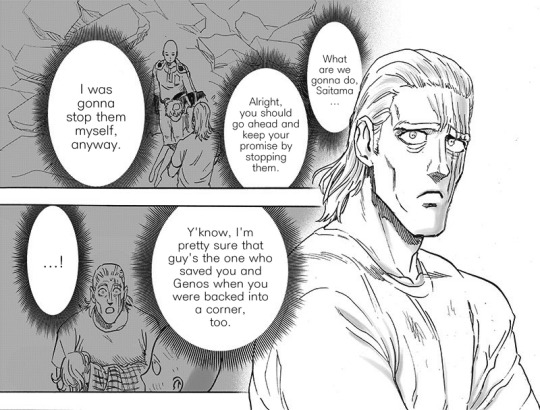
So as long as Saitama believes in King, he probably won't come to any real harm. But Saitama also has to believe in his own ability to actually help King if the need arises and act upon it, because otherwise it'll just be 166 chapter redux in the absolute worst case scenario.
-*-
So, about perceptive biases towards Saitama, they come out in negative light by default unless proven wrong by him directly.
I'll let the following panel demonstrate. (Chapter 55.7, Sense, vol 20 Extra)

The judge became immediately biased without any reason and attacked his integrity and pretended to know all about him when he actually knows nothing, despite this being ONLY a hero suit contest, not a character judgement and ignoring Saitama's explanation to why he likes to wear what he wears.

The judge won't acknowledge what he saw with his plain eyes as he refuses to believe what happened, Genos is showing different kind of bias because he too, is biased in favour of Saitama and thinks Saitama should win a hero suit contest just because he's strong, despite objectively having a really bland and cheap outfit even HE didn't like. Like a cosplay contest gone wrong if the judge just picks their favourite without any objectivity to their actual suit or performance and what is the point of the judging in the first place. Other people, despite cheering him on...show their true facets with their snide negative comments with their leaps of logic, attempting to tear him down for his good deed and nobody criticises them.
Now for a different kind of perception bias. (Chapter 16, Passed the exam)

Chewing gum might on a first glance, seem very disrespectful when towards authority figures who want your full attention because it inherently implies that the person is too busy chewing gum rather than paying attention, thus creating bias.
However the act of chewing gum in a situation where one wants to study and retain information has been seen as beneficial by studies.
Turns out, chewing gum may have more effects than simply making your breath smell good, or giving you something to do when bored. In fact, some studies show chewing gum can actually increase feelings of relaxation, increase attention, lower stress levels, and improve memory.
Saitama has shown even at the early stages of his teenager years that he DOES actually possess the attention span to study...as long as the subject actually interests him and he has selective interests. Despite all the chatter around him, he's able to tune them out and focus on his study. Give him something really dry and boring that just won't seem to stick and his attention span will waver, because attention is a resource to be managed.
Things like studying psychology can have their humble beginnings often in the interest in what affects human health, because personality types who are keen about bettering others like knowing what makes people tick in order to help them.

So it can be assumed that Saitama, knowing he has a poor attention span in boring seminars but has studied the subject before, anticipated this and simply brought chewing gum to help him focus just a bit more. Unfortunately, Snek became hostile to him and Saitama completely lost his focus and his attention wavered. This is how negative perception bias affects Saitama in his everyday life.
Another example of this selective attention span is where he watches the television because he's also interested in bettering the world as a whole, again because he likes helping other people and it brings him satisfaction. He often watches tv as an adult as well, to the point of doomscrolling. He even has Mob Psycho shirt on, a nod to ONE's other series to show that he's very empathic at his core. (Chapter 8.5, 200 yen, Vol 1 extra)

However, it is also shown that Saitama is incredibly sensitive to baseless judgement, hostility, bias and outside influence and he will get defensive and angry when faced with such and when challenged. (Meteor and Sea king fiasco) People like this who also have high moral integrity like Saitama has shown time to time again, also care great deal about their reputation in other's eyes, because it shows to them if they are doing a good job or not in their moralistic actions. Like a peer review.
Not getting any good feedback and instead met with various levels of hostility just conditions them to not try at all because they think it's their fault that everyone is against them. So Saitama early on has been faced with conditioning and now for instance, he thinks he just can't learn anything new even if he made an honest attempt. He has become insecure and self-critical and will think of himself in a negative light. (Stagnation and growth, chapter 76.) He has effectively build cognitive biases about himself and his true identity.

Here is Saitama attempting to unravel the cognitive bias around himself because he made a self-discovery. King, in his infinite wisdom, gives Saitama some objective perspective when Saitama immediately wants his second opinion about his perspective surrounding this new discovery. King, bless his heart, attempts to genuinely help Saitama but he misses the point of the discussion when Saitama was trying to see if he could bounce his ideas around, such as throwing a video game analogy to King that Saitama knows he SHOULD understand well. Saitama is just very poor at expressing his words due to his upbringing and loneliness and detatchment from emotions, especially without properly parsing it out first. He often thinks a lot louder than he seems to talk, which is why he's often misunderstood.
That is, unless he apparently connects on a deep level like with Genos and then the two of em could talk about anything and everything that comes to mind for days or until they run out of breath lmao. (Maji Drama CD vol 1, Saitama makeover)
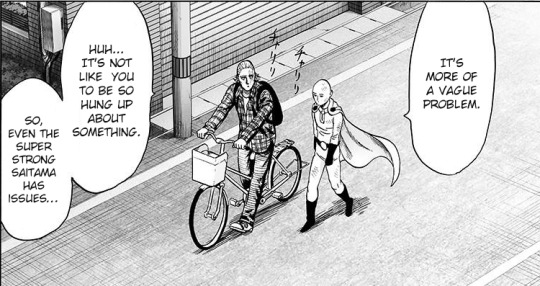
King's perception bias towards Saitama is because he just does not know him well enough and his perspective is a bit skewed because of media influence that bring him comfort for his own emotional loneliness...because Saitama is always hung up about something or another because he has so much issues it hurts. King just does not see it or is not willing to believe "Super strong Saitama" could possibly have any issues since Saitama hides them well.
Saitama has far too much free time to think and ruminate, but his own cognitive biases stop him from seeing his true self without all the negativity surrounding him. The negativity of things such as his upbringing as a lonely boy who's sensitive to hostility. (Chapter 15.5, Brushing up, vol 2 extras)

-*-
Perception bias also serves another more...sinister purpose for Saitama. Psychological conditioning. There is potential evidence for deprivation of basic needs, conditioning for violence for protection and subliminal messages for suggestion, among other things. I won't go into details because I'm afraid of also potentially spoiling stuff, so I'll keep the suspense. :D

Here's maslow hierarchy of needs pyramid that explains about our intrinsical needs as human beings to have wellness in both body and mind.
Being deprived of all these needs is akin to mental torture. But so is facing all of the underlying issues at once via hypnotherapy and cognitive behavioural therapy if the patient is sufficiently dysfunctional in a societal setting like Saitama happens to be. Especially if the therapies are performed...poorly.
CBT has shown to be the most effective intervention for people exposed to adverse childhood experiences in the form of abuse or neglect Criticism of CBT sometimes focuses on implementations (such as the UK which may result initially in low quality therapy being offered by poorly trained practitioners. However, evidence supports the effectiveness of CBT for anxiety and depression. Evidence suggests that the addition of hypnotherapy as an adjunct to CBT improves treatment efficacy for a variety of clinical issues. Post Traumatic Stress Disorder (PTSD) and its symptoms have been shown to improve due to implementation of hypnotherapy, in both long and short term. As research continues, hypnotherapy is being more openly considered as an effective intervention for those with PTSD.
In short, in order to heal mentally, Saitama may need to face mental torture because he has such strong willpower and such strong mental barriers shielding his vulnerabilities on a basic primal need. He can essentially dip himself on lava and ignore the shock reaction from the extreme heat (Chapter 112, Sacrifice) and does not even need to breathe in space and does not notice the extreme cold or pressure of space nor the sun's harmful rays, that's how strongly he shields himself from outside influence. (Saitama vs Garou fight, cpt 167-168) But there only needs to be a sufficient trigger.
ONE sent Saitama home to restore his energy levels in Chapter 197, What only I can do...because he's going to sorely need them for the upcoming confrontation.
Empty Void's ability to genjutsu people casually and cause parallel shifts in the reality and using these to abuse emotional dependencies is like a loaded Chekov's gun on Saitama's forehead. Because Saitama has been roleplaying to re-learn his emphatic skillset after he had suffered too much mental trauma and he's done that a lot with Genos just via interaction. I heavily suspect that Saitama's emotional regulation and empathy suffered when he became too strong and he was emotionally blunting himself.
So, if they so happened to use Genos against him and trigger his PTSD, there's no telling how Saitama will react.
Saitama more than likely has some mental illnesses like disorders and at the very minimum PTSD, not just depression, which can be used maliciously against him and the entire OPM world. There is one more thing about psychological conditioning, but I'm not gonna say it out loud here on this meta, I'm afraid to spoil it. :p *rubs hands gleefully*
There is also a high chance that if he's stressed enough and sleep deprivated enough, he could honestly go into psychosis if the entire world suddenly turned on him because he's sensitive to criticism and hostility.
Psychosis is a condition of the mind or psyche that results in difficulties determining what is real and what is not real. Symptoms may include delusions and hallucinations, among other features. Additional symptoms are incoherent speech and behavior that is inappropriate for a given situation. There may also be sleep problems, social withdrawal, lack of motivation, and difficulties carrying out daily activities. Psychosis can have serious adverse outcomes.
That's where he would truly become a danger to both himself and the entire Earth he's living on if he starts to have delusions, hallucinations and becomes out of touch with reality and also paranoid. So unless Saitama's mental health is adressed in a proper environment, he's a ticking time bomb till someone pulls the trigger on that PTSD and other issues he has. Empty Void can easily do exactly that by abusing his attachment to Genos in a cruel way, just like he tried to do with Flash and Sonic, starting from Chapter 200, Void.
Even seemingly normal, kind and well-adjusted people at the core can become very unpredictable when under high amount of duress and psychosis.
As underlined above, everyone always seems to default to the negative viewpoint of Saitama due to their perception biases and if Saitama's true strenght became more know...public would outright fear him simply because they cannot understand the scale of how powerful Saitama actually is, abnormally strong. Like they'd suddenly become prey to some unknown entity. Add in Saitama becoming more and more loose with his inhibitions from things like sleep depression and they'd have a huge mess in their hands.
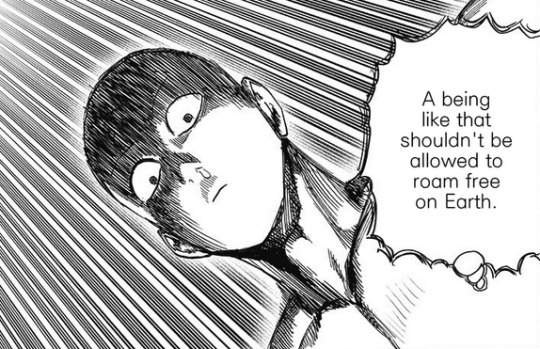
Even Garou who fought against Saitama with everything he has, is completely shocked about how insane Saitama's abilities are, because they defy physic laws like it's nothing, so Garou goes "This is insane! What the hell IS this monster!?" when Saitama sneezed jupiter apart. (Awakening of the gods, chp 168)
Saitama has also shown dubious morality by attempting to punch and kill Garou to avenge Genos, but not really thinking or caring that the entire Earth would become collateral damage like Blast mentions as he portals and contains the explosion in Earth atmosphere. Chapter 166, Squared & Cpt 167, I.o) Saitama's mental state, when normally calm and seemingly well-adjusted, was thrown out of the window when he saw Genos died on him and has now become a PTSD trigger. He literally vented out all that anger in his fist in a massive clash of divine power, as told by the Blastice league.
So if perception bias surrounding Saitama was to turn sideways and he'd get dumped the pressure of the world against him, the consequences might become...bad. Saitama needs to be able to regulate his emotions far better in order to withstand mass scale attack from public opinion. Otherwise ONE is playing with fire with Saitama's mental health state, because he does NOT react well to criticism an such and will lash out like he did during the meteor incident, but far worse.
Thus, a danger to society.
-*-
Tl;dr: King has always been viewed in positive light so people perceive his powers as good thing and non-threat because they believe King is a great hero, whereas Saitama has always been surrounded by negative preconceptions about whatever he seems to be doing and public opinion about his hero status is not good, so Saitama busting out his massive, unknown power would instead cause uproar and mass scale panic that someone is even capable of such.
Thanks all for reading and thank you itsmaferart for this question. :)
#opm#one punch man#saitama#opm king#opm meta#perceptional bias#conditioning#mental health#charanko#opm Bang#Psykos#cognitive bias#my own work#psychology#maslow hierarchy of needs#long post
24 notes
·
View notes
Text
This is your Friendly Reminder to make sure you're actually observing trends in data and not just applying one of the many human cognitive biases that plague everyday discourse and discussion
138 notes
·
View notes
Note
ive noticed each time sth tragic occurs to someone i reach out for these cosmic "explanations" (im not religious) like they must have done smth bad that's why smth happened to them but i realize that this is unfair to people and has an effect of blunting empathy to people who are experiencing hardship do you have any ideas why pple think like this i know it's irrational and i want to change this my first thought is maybe it's cognitive biases maybe self defensive Thanks for your
Yes, it is a cognitive bias, commonly called "just-world fallacy". The researcher who coined the term called it "a fundamental delusion". And, yes, one of its negative consequences is loss of empathy.
Why do people suffer this bias? It's complicated. Suffice it to say that it is indeed a defense mechanism: 1) a way to deny difficult realities, and 2) a way to avoid uncomfortable feelings and emotions that arise from witnessing suffering and victimization (such as guilt, shame, anger, disgust, or helplessness).
Reducing the world into simple dichotomies such as "deserving/undeserving" or "perpetrators/victims" grants people a feeling of understanding the world and, thereby, a false sense of control over it. Unfortunately, the fact is that when you oversimplify cause-and-effect, you're more likely to end up with faulty beliefs about the world. And when you oversimplify moral concepts, it makes you incapable of sound moral reasoning. Making bad moral judgments/decisions can lead you to make morally difficult situations even worse.
If you don't want to suffer from this cognitive bias, you must face up to how complicated the world really is. Although it can be a scary and difficult process, you have to: 1) work on your emotional intelligence so that you can process negative feelings properly rather than bury them behind defense mechanisms, and 2) work on your critical thinking skills so that you are better able to unravel complexities and arrive at truth through proper reasoning.
#empathy#just world fallacy#just world hypothesis#critical thinking#morality#moral reasoning#cognitive bias#defense mechanisms#emotional intelligence#ask
6 notes
·
View notes
Text

The Illusion of Complexity: Binary Exploitation in Engagement-Driven Algorithms
Abstract:
This paper examines how modern engagement algorithms employed by major tech platforms (e.g., Google, Meta, TikTok, and formerly Twitter/X) exploit predictable human cognitive patterns through simplified binary interactions. The prevailing perception that these systems rely on sophisticated personalization models is challenged; instead, it is proposed that such algorithms rely on statistical generalizations, perceptual manipulation, and engineered emotional reactions to maintain continuous user engagement. The illusion of depth is a byproduct of probabilistic brute force, not advanced understanding.
1. Introduction
Contemporary discourse often attributes high levels of sophistication and intelligence to the recommendation and engagement algorithms employed by dominant tech companies. Users report instances of eerie accuracy or emotionally resonant suggestions, fueling the belief that these systems understand them deeply. However, closer inspection reveals a more efficient and cynical design principle: engagement maximization through binary funneling.
2. Binary Funneling and Predictive Exploitation
At the core of these algorithms lies a reductive model: categorize user reactions as either positive (approval, enjoyment, validation) or negative (disgust, anger, outrage). This binary schema simplifies personalization into a feedback loop in which any user response serves to reinforce algorithmic certainty. There is no need for genuine nuance or contextual understanding; rather, content is optimized to provoke any reaction that sustains user attention.
Once a user engages with content —whether through liking, commenting, pausing, or rage-watching— the system deploys a cluster of categorically similar material. This recurrence fosters two dominant psychological outcomes:
If the user enjoys the content, they may perceive the algorithm as insightful or “smart,” attributing agency or personalization where none exists.
If the user dislikes the content, they may continue engaging in a doomscroll or outrage spiral, reinforcing the same cycle through negative affect.
In both scenarios, engagement is preserved; thus, profit is ensured.
3. The Illusion of Uniqueness
A critical mechanism in this system is the exploitation of the human tendency to overestimate personal uniqueness. Drawing on techniques long employed by illusionists, scammers, and cold readers, platforms capitalize on common patterns of thought and behavior that are statistically widespread but perceived as rare by individuals.
Examples include:
Posing prompts or content cues that seem personalized but are statistically predictable (e.g., "think of a number between 1 and 50 with two odd digits” → most select 37).
Triggering cognitive biases such as the availability heuristic and frequency illusion, which make repeated or familiar concepts appear newly significant.
This creates a reinforcing illusion: the user feels “understood” because the system has merely guessed correctly within a narrow set of likely options. The emotional resonance of the result further conceals the crude probabilistic engine behind it.
4. Emotional Engagement as Systemic Currency
The underlying goal is not understanding, but reaction. These systems optimize for time-on-platform, not user well-being or cognitive autonomy. Anger, sadness, tribal validation, fear, and parasocial attachment are all equally useful inputs. Through this lens, the algorithm is less an intelligent system and more an industrialized Skinner box: an operant conditioning engine powered by data extraction.
By removing the need for interpretive complexity and relying instead on scalable, binary psychological manipulation, companies minimize operational costs while maximizing monetizable engagement.
5. Black-Box Mythology and Cognitive Deference
Compounding this problem is the opacity of these systems. The “black-box” nature of proprietary algorithms fosters a mythos of sophistication. Users, unaware of the relatively simple statistical methods in use, ascribe higher-order reasoning or consciousness to systems that function through brute-force pattern amplification.
This deference becomes part of the trap: once convinced the algorithm “knows them,” users are less likely to question its manipulations and more likely to conform to its outputs, completing the feedback circuit.
6. Conclusion
The supposed sophistication of engagement algorithms is a carefully sustained illusion. By funneling user behavior into binary categories and exploiting universally predictable psychological responses, platforms maintain the appearance of intelligent personalization while operating through reductive, low-cost mechanisms. Human cognition —biased toward pattern recognition and overestimation of self-uniqueness— completes the illusion without external effort. The result is a scalable system of emotional manipulation that masquerades as individualized insight.
In essence, the algorithm does not understand the user; it understands that the user wants to be understood, and it weaponizes that desire for profit.
#ragebait tactics#mass psychology#algorithmic manipulation#false agency#click economy#social media addiction#illusion of complexity#engagement bait#probabilistic targeting#feedback loops#psychological nudging#manipulation#user profiling#flawed perception#propaganda#social engineering#social science#outrage culture#engagement optimization#cognitive bias#predictive algorithms#black box ai#personalization illusion#pattern exploitation#ai#binary funnelling#dopamine hack#profiling#Skinner box#dichotomy
3 notes
·
View notes
Text
The Egregious Self
(Issue 47 — Part II of III)





#zine#predictive processing#free energy principle#neurodiversity#cognitive bias#Friston#punk philosophy#allists#cognition#holoarch#complexity#constructionism#asd
3 notes
·
View notes
Text
Using Social Media less helped.
I'm not just saying it. I felt it.
When I quit using Twitter/X and instagram? I realized how badly it was screwing with my cognitive bias. Being on social media trains you to see the WORST in people and the world because its all you see.
People being smartasses, people thinking they're funny for saying the rudest stuff. Just constant bitterness all the time.
People irl were being nice to me all the time, and I "appreciated" it. However, I took it with a grain of salt.
The decision to not exposing myself to disgusting, rude, or extremist people made the day to day moments feel different.
I felt people's pleasantries a lot more deeply. I told the old lady at Wal-mart thank you after checking my receipt and she smiled sincerely because I was nice to her. I went to the new pizza place that opened up and he delivered my food with enthusiasm, he was genuinely happy to have customers, and I gave that energy right back to him.
Those little moments? They were ALWAYS there, but I didn't -feel- them because of how social media showed me the worst of people
My day felt better because I was paying attention to MY day for once.
4 notes
·
View notes
Text
Classroom Articles

The Back Drawer Effect of Perception
To interpret and understand the data that our mind receives—perception—is one of the trickiest and most natural qualities of human cognition. As Immanuel Kant argued, our perceptions actively shape our external reality rather than merely reflecting it.
Research suggests that the human brain generates between 6,000 to 70,000 thoughts per day. Astonishingly, 80-90% of these thoughts are repetitions of "yesterday's logic", meaning most of what we think today is recycled from the past.
These recurring thoughts influence our beliefs, ethics, choices, and actions, leading us to question: How impactful is our subconscious programming, a.k.a our mental “back drawer”?

The Back Drawer: Subconscious Conditioning
The back drawer consists of stored mental patterns shaped by childhood experiences, social conditioning, and repeated life events.
For instance, if you were frequently told as a child that you’re “not good at math,” your subconscious mind would reinforce this belief, affecting your confidence and effort in the subject. Over time, this internalized belief manifests in real-world struggles, regardless of actual ability.
"Neurons that fire together, wire together."
-Dr. Joe Dispenza
Our brains automate repeated thoughts and behaviors, making change feel difficult and unnatural.
This leads to a self-reinforcing cycle of perception and reality:
Same Thoughts → Same Choices → Same Behaviors → Same Experiences → Same Feelings → Repeated Thoughts
Unless actively interrupted, this cycle continues indefinitely.
"The mind defaults to past patterns unless actively interrupted."
-Daniel Kahneman

The Subjective Nature of Truth
My father once gave me a perspective-changing lesson in elementary school. He said:
"Two people may witness the same event but interpret it in completely different ways."
This happens constantly in society, revealing that perception is shaped by personal experience, emotions, and cognitive biases.
As Friedrich Nietzsche argued:
"There are no facts, only interpretations."
Truth, then, is often subjective. What one person sees as undeniable, another might challenge based on their unique perspective.
(For example, some people argue that Taka—better known as Scar from The Lion King—was driven to villainy because Mufasa stole his ultimate crush. While I disagree, the debate itself shows how perception influences narrative.)

Rewiring Perception & Thought Patterns
To transform perception, one must be open and eager to:
1. Actively Question Core Beliefs
Self-introspection is key. Ask yourself:
What beliefs are limiting me?
Where did they come from?
What evidence do I have to challenge them?
2. Implement a “Delulu” Strategy for Success
("Delulu" = conscious belief in an optimistic, alternative reality until it becomes true.)
"Act as if what you do makes a difference. It does."
-As William James
3. Commit to Repetition & Exploration
New beliefs, thoughts, and actions must be practiced repeatedly to override the subconscious back drawer. Growth is often chaotic, but necessary.
If you grew up believing that money is hard to make, actively seek proof that contradicts this belief.
If you were conditioned to fear failure, intentionally expose yourself to small failures and reframe them as lessons.

Conclusion
The thoughts we hold, consciously or unconsciously, dictate the reality we experience. The mind is a powerful tool—it can either keep us trapped in old patterns or propel us toward transformation.
The question is:
Will you consciously design your reality, or will you let the past decide it for you?
_____
Inspired by:
This post was inspired by the thought-provoking video “Give Me 21 Minutes and You’ll Never Suffer Again – You’re Stuck on a Loop”. The video explores the power of subconscious programs, repeated thought patterns, and how they shape our reality. It offers deep insights into how our minds can be reprogrammed for transformation.
🎥 Watch it here:
youtube
#trc magazine#learning#classroom articles#understanding#human nature#perception#mindset#subconscious#thought patterns#self awereness#psychology#neuroscience#habits#immanuel kant#friedrich nietzsche#william james#daniel kahneman#joe dispenza#cognitive bias#philosophy of mind#habit loop#delulu strategy#delulu mindset#mental transformation#self discovery#repetitio effect#reality creation#Youtube
4 notes
·
View notes
Text
I’m so genuinely tired of “all or nothing” thinking on this site.
I’ll be saying it until the day I die…most things in life are so much more complicated than good/bad binaries. Spending all your time trying to be “good” according to overly simplistic, false binaries is bound to fail you in the long run.
#cognitive bias#cognitive distortions#all or nothing thinking#life is nuanced#false dichotomy#false binary
53 notes
·
View notes
Text
Cognitive Biases
Fundamental attribution error (FAE, aka correspondence bias)
Tendency to overemphasize personality-based explanations for behaviors observed in others. At the same time, individuals under-emphasize the role and power of situational influences on the same behavior. Edward E. Jones and Victor A. Harris' (1967) classic study illustrates the FAE. Despite being made aware that the target's speech direction (pro-Castro/anti-Castro) was assigned to the writer, participants ignored the situational pressures and attributed pro-Castro attitudes to the writer when the speech represented such attitudes.
Implicit bias (aka implicit stereotype, unconscious bias)
Tendency to attribute positive or negative qualities to a group of individuals. It can be fully non-factual or be an abusive generalization of a frequent trait in a group to all individuals of that group.
Priming bias
Tendency to be influenced by the first presentation of an issue to create our preconceived idea of it, which we then can adjust with later information.
Confirmation bias
Tendency to search for or interpret information in a way that confirms one's preconceptions, and discredit information that does not support the initial opinion. Related to the concept of cognitive dissonance, in that individuals may reduce inconsistency by searching for information which reconfirms their views (Jermias, 2001, p. 146).
Affinity bias
Tendency to be favorably biased toward people most like ourselves.
Self-serving bias
Tendency to claim more responsibility for successes than for failures. It may also manifest itself as a tendency for people to evaluate ambiguous information in a way beneficial to their interests.
Belief bias
Tendency to evaluate the logical strength of an argument based on current belief and perceived plausibility of the statement's conclusion.
Framing
Tendency to narrow the description of a situation in order to guide to a selected conclusion. The same primer can be framed differently and therefore lead to different conclusions.
Hindsight bias
Tendency to view past events as being predictable. Also called the "I-knew-it-all-along" effect.
Embodied cognition
Tendency to have selectivity in perception, attention, decision making, and motivation based on the biological state of the body.
Anchoring bias
The inability of people to make appropriate adjustments from a starting point in response to a final answer. It can lead people to make sub-optimal decisions. Anchoring affects decision making in negotiations, medical diagnoses, and judicial sentencing.
Status quo bias
Tendency to hold to the current situation rather than an alternative situation, to avoid risk and loss (loss aversion). In status quo bias, a decision-maker has the increased propensity to choose an option because it is the default option or status quo. Has been shown to affect various important economic decisions, for example, a choice of car insurance or electrical service.
Overconfidence effect
Tendency to overly trust one's own capability to make correct decisions. People tended to overrate their abilities and skills as decision makers.See also the Dunning–Kruger effect.
Physical attractiveness stereotype
The tendency to assume people who are physically attractive also possess other desirable personality traits.
(via: Cognitive bias - Wikipedia)
15 notes
·
View notes